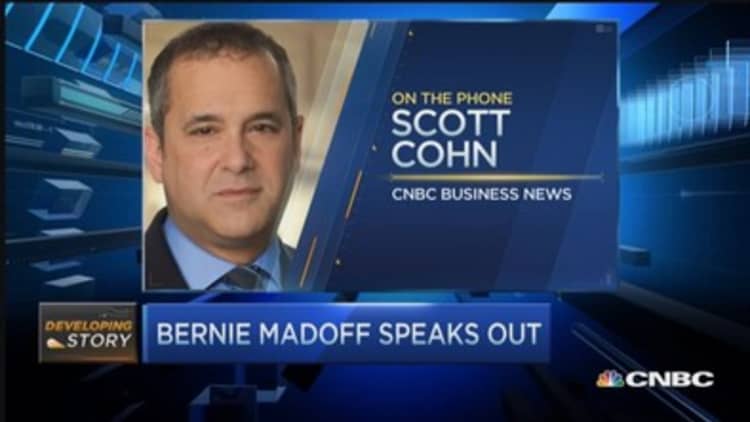
Despite a federal criminal investigation in which 15 people were convicted and a major bank paid a multibillion dollar penalty, Bernard Madoff is still insisting he acted alone in his epic fraud.
The assertion comes in a series of e-mails to CNBC from the federal prison where Madoff is serving a 150-year prison sentence. U.S. authorities recently signaled that the six-year criminal investigation into the scam was nearing an end, when they moved for the immediate sentencing of the last remaining cooperating witnesses.
In the new e-mails, Madoff takes pains to defend his two sons, both of whom have died. Mark Madoff committed suicide in 2010, and Andrew Madoff succumbed to cancer last year.
"As difficult as it is for me to live with the pain I have inflicted on so many, there is nothing to compare with the degree of pain I endure with the loss of my sons Mark and Andy," Madoff wrote in an e-mail dated Thursday and received Friday.
"I live with the knowledge that they never forgave me for betraying their love and trust. As much as I tried to reach out to them in an attempt to explain the circumstances that caused my betrayal they could not find it possible to forgive me. I do understand their unwillingness. The fact that I was trying to protect our family by sheltering them from any knowledge or involvement in my wrong doing still fails to allow me to forgive myself."
Madoff insisted in a separate e-mail that he led his family, employees and the SEC to believe that years of stock trades that turned out to be fictional were carried out on an overseas electronic trading platform known as PRIMEX, a joint venture between his firm and several Wall Street investment banks.
"Because the SEC was well aware of how PRIMEX worked and the global reach and capability to execute the trades with any firm linked into the system, this explanation made perfect sense to them," Madoff wrote in an email dated Tuesday.
The comments are Madoff's first in a year—a year in which five former employees were convicted for their roles covering up the scam, and in which Andrew Madoff died in September after a long battle with cancer.
Irving Picard, the court-appointed trustee seeking to recover funds for victims, had sued both of Madoff's sons claiming they knew or should have known about the fraud, in part based on money they received from their father's firm. The suits continue against the sons' estates. Both had claimed they could not have known about the fraud, since it occurred in a part of the business they had no involvement in.
Read More Five years later, Madoff still trying to control the story
Their father agrees.
"The Trustee claimed that my sons should have known that I was not executing any trades for my advisory clients. I have gone to great lengths to counter this claim by explaining that like all brokerage firms, we were required to have 'Chinese Walls' in place to avoid any conflict of interest between our different departments like the market making that Mark managed and the proprietary trading department that Andy managed from the investment advisory department managed by me."
Picard's office said it is unimpressed with Madoff's latest claims.
"As the perpetrator of the largest fraud in history, Mr. Madoff is highly suspect and his assertions bring no substantive value. We stand by our filings, which speak for themselves, and we intend to pursue recoveries against both estates," spokeswoman Amanda Remus said in a statement.
In his most recent e-mail, Madoff pointed the decision by a British court dismissing claims against his sons.
"I would remind everyone that the Trustee's civil litigation against my sons as directors of Madoff Securities International in London was not only DISMISSED, the judge lambasted the trustee for his baseless claims and unnecessary harassment of my sons," Madoff wrote.
But Remus suggested Madoff is taking the decision out of context.
"We would note that it involved a narrow action related to directors' liability, and is unrelated to the SIPA Trustee's action which details fictitious trading in their (Madoff) accounts and sham loans to the Madoff brothers."


